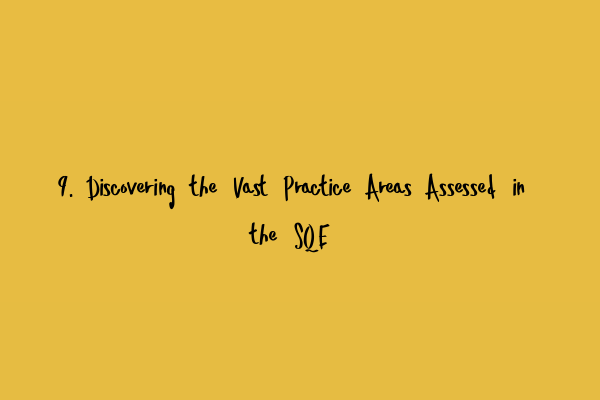Are you considering taking the SQE (Solicitors Qualifying Exam)? Congratulations on taking this step towards becoming a qualified solicitor. The SQE is a comprehensive assessment that tests your knowledge and abilities in various practice areas of law. In this blog post, we will explore the vast practice areas assessed in the SQE and how you can prepare effectively for each one.
1. Contract Law
In the SQE, you can expect to encounter questions relating to contract law. This area covers the formation, interpretation, and enforcement of contracts. Familiarize yourself with key principles such as offer and acceptance, consideration, and the elements of a valid contract.
2. Criminal Law
Criminal law is another important practice area assessed in the SQE. You should have a sound understanding of the various types of criminal offenses, the elements required to establish guilt, and the defenses that may be applicable.
3. Civil Litigation
Civil litigation is a broad area that covers disputes between individuals or organizations. You should be familiar with the civil procedure rules, including the process of filing a claim, gathering evidence, and presenting your case before a court.
4. Tort Law
Tort law deals with civil wrongs and the remedies available to the injured party. Make sure you understand concepts such as negligence, duty of care, causation, and damages. Being able to analyze hypothetical scenarios and apply the relevant principles is essential.
5. Property Law
Property law encompasses both real property (land and buildings) and personal property (movable assets). Study the various types of interests in land, such as leasehold and freehold, and the rules governing conveyancing and land registration.
6. Constitutional and Administrative Law
Constitutional and administrative law focuses on the powers and limitations of government bodies, as well as the rights of individuals. Understand the principles of judicial review, the separation of powers, and the European Convention on Human Rights.
7. Equity and Trusts
Equity and trusts deal with the principles and rules governing the administration of trusts and equitable remedies. Familiarize yourself with concepts such as the creation of trusts, fiduciary duties, and the different types of trusts.
8. Professional Conduct and Regulation
Professional conduct and regulation are essential for solicitors. Study the Solicitors Regulation Authority (SRA) Code of Conduct, including the principles of client care, confidentiality, and conflicts of interest. Understand the regulatory framework governing solicitors’ professional conduct.
9. Commercial and Business Law
Commercial and business law covers legal matters relating to businesses and commercial transactions. You should have a good understanding of contract law, company law, and the legal requirements for starting and operating a business.
These practice areas form the core of the SQE assessments, and it is crucial to have a solid grasp of each one. To prepare effectively for the SQE, consider utilizing various resources such as online study materials, mock exams, and preparatory courses. Time management is also a key factor, so make sure to check out our related article on Mastering Time Management in SQE: Strategies for Efficient Exam Completion.
Multiple-choice questions (MCQs) are a common format in the SQE. To enhance your performance in this type of question, our article on Conquer the Multiple Choice Questions (MCQ) in SQE1 provides valuable insights and strategies.
Effective revision techniques are crucial to success in the SQE. Our article on Mastering Effective Revision Techniques for SQE Success offers guidance on how to optimize your study sessions and retain information effectively.
The SQE also includes scenario-based questions that test your problem-solving skills. For tips on tackling these types of questions, check out our article on Scenario-Based Questions SQE2: Enhance Your Problem-Solving Skills.
After completing the SQE, it is essential to understand and learn from your feedback. Our article on Understanding SQE Feedback: Extracting Valuable Insights provides guidance on how to analyze your results and identify areas for improvement.
With proper preparation and a thorough understanding of the practice areas assessed in the SQE, you can increase your chances of success. Good luck in your journey towards qualifying as a solicitor!
